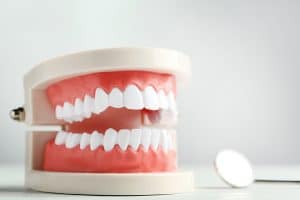 Maintaining a healthy smile is typically simple with a good dental hygiene and preventive dental care routine. Yet, sometimes, that maintenance requires addressing specific concerns, such as periodontal (gum) disease, before they’re allowed to cause significant damage to your teeth and oral tissues. Such issues occur commonly – periodontal disease alone affects over 80% of adults in the U.S. – but they don’t always have to. In fact, despite the frequent occurrence of gum disease, many patients in Encinitas/San Diego, successfully prevent it from developing with help from their dentists and periodontal experts.
Maintaining a healthy smile is typically simple with a good dental hygiene and preventive dental care routine. Yet, sometimes, that maintenance requires addressing specific concerns, such as periodontal (gum) disease, before they’re allowed to cause significant damage to your teeth and oral tissues. Such issues occur commonly – periodontal disease alone affects over 80% of adults in the U.S. – but they don’t always have to. In fact, despite the frequent occurrence of gum disease, many patients in Encinitas/San Diego, successfully prevent it from developing with help from their dentists and periodontal experts.
Know How It All Starts
For many people, periodontal disease develops and escalates because they don’t fully understand how it starts. The beginning stage of the disease, known as gingivitis, develops when harmful oral bacteria get too numerous and stay too long along your gum line. In time, they work their way underneath your gums and their presence leads to infection, inflammation, and progression to more severe gum disease.
The Best Ways to Prevent It
When patients understand how gum disease develops, it becomes much easier to successfully prevent it. For example, if you know that certain oral bacteria like to accumulate on your gum line, then you’ll be more likely to intentionally clean your gum line when brushing and flossing your teeth. If you know that gingivitis causes your gums to bleed, then you’ll be more likely to schedule dental visit as soon as possible if you notice blood when you brush your teeth.
What if Prevention Fails?
Even if gingivitis does develop, you still have a good chance of reversing it or keeping it minor by seeking treatment as soon as possible. Periodontal cleaning, or scaling and root planing, can remove the bacteria from underneath your gums so that the tissues can heal. If any part of your gums has become extensively diseased, then expert periodontal treatment and maintenance can restore them and stop gum disease from progressing further.
Find Out if You Can Prevent Periodontal Disease
When it’s allowed to develop and progress, periodontal disease can become one of your smile’s greatest threats. Fortunately, you can prevent periodontal disease and its potential risks with expert care and maintenance. For more information, schedule a consultation with Dr. Kania by calling her periodontal office in Encinitas/San Diego, CA, at (760) 642-0711.



